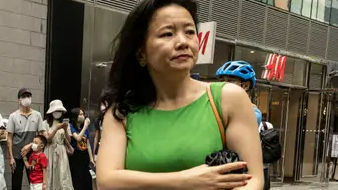Cheng Lei, a
Chinese-born Australian TV news anchor who worked for the Chinese state-sponsored
(CGTN) China Global Television Network, was detained by Beijing authorities in
August 2020 and is now facing a closed-door trial on charges of espionage. On
Thursday (March 31, 2022), Australian ambassador to China Graham Fletcher was
not allowed to attend the Cheng Lei’s hearing because Chinese authorities
maintained that the case pertained to state secrets.
Also Read | Australian TV news anchor Cheng Lei faces secret trial in China for spying
Who is Cheng
Lei?
Cheng Lei was born
in China but is a citizen of Australia. The Chinese system does not allow for
dual citizenship. She had been working with CGTN, a Chinese state media outlet,
for a number of years until her detention. In August 2020, Cheng Lei
disappeared from Chinese television screens and her profile page as well as
work was removed from the CGTN website.
A month later, Beijing
authorities confirmed her detention and accused her of “supplying state secrets
overseas.”
Also Read | China’s Xi Jinping strongly backs Afghanistan at regional conference
Cheng Lei’s news
shows were not seen to be transgressive, according to news reports. She has
been described by observers as a model state broadcaster who knew where the
boundaries were.
Much of Cheng Lei’s
family, including her two sons, lives in Australia. At the time of her
detention, her niece Louisa Wen had said, “I don’t think she would have done
anything to harm national security in any way intentionally. We don’t know if
she’s just caught up in something she didn’t herself realise.”
Also Read | Russia, China set eyes on new ‘world order’ free of hegemony
On her Twitter
account, Cheng Lei described herself a “passionate orator of the China story.”
Geoff Raby, a friend of Cheng Lei who spoke to the BBC, said that Lei was a “very
experienced journalist,” was objective, and worked within the constraints of
the state broadcaster.
While China’s
treatment of journalists has often come under the scanner, with Reporters
Without Borders describing China as the “world’s biggest captor of journalists,”
political observers also see the rising tensions between Australia and China
play a role in how her detention and trial are playing out.







